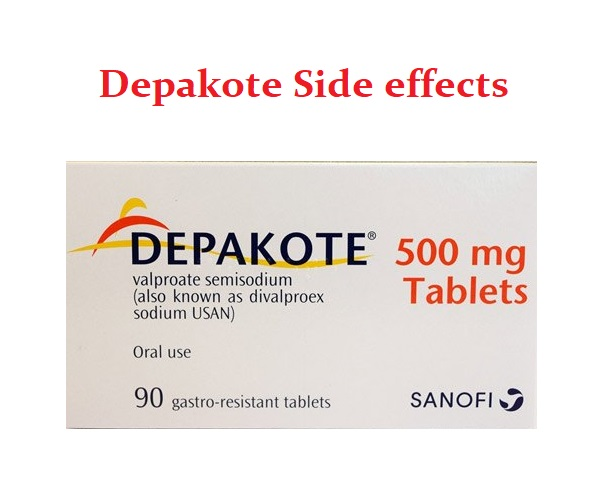Depakote side effects range from mild to very severe. It results in liver failure, pancreatitis, anemia, and bone marrow failure.
Depakote is the brand name of Divalproex sodium or sodium valproate. It is a prescription medication that is used to treat symptoms such as mania, epilepsy, and migraine. You can use Depakote alone or in combination with other medications.
Depakote Side effects
Serious side effects of Depakote are listed below:
- Hepatic failure
- Birth defects
- In utero exposure causes a decrease in intelligence
- Pancreatitis
- Hyperammonemic Encephalopathy
- Suicidal thoughts and behavior
- Bleeding and other hematopoietic disorders
- Hypothermia
- Multiorgan hypersensitivity reactions/Drug Reaction with Eosinophilia & Systemic Symptoms (DRESS).
Older age people are susceptible to somnolence:
- Clinical studies are conducted under a variety of conditions. Therefore, adverse reactions rates seen in clinical trials of drugs cannot be directly compared with rates in clinical studies of other drugs. They may not reflect actual rates in practice.
Mania:
- Based on data from two placebo-controlled, three-week-long clinical trials of Depakote for the treatment of bipolar disorder manic episodes, we have determined that there is an increase in treatment-emergent events.
- Although the adverse reactions were often mild to moderate in severity, they were sometimes severe enough to stop treatment.
- Clinical trials showed that there was no statistically significant difference in the rates of premature terminations due to intolerance between Depakote and placebo.
- A total of 4% to 8%, 11%, and 11% of patients stopped receiving treatment due to intolerance in Depakote and placebo groups, respectively.
The whole body:
- Chest pain, fever, chills, chills, and fever.
Cardiovascular System:
- Hypertension and hypotension, palpitations postural hypotensions, tachycardia, vasodilation.
Digestive System:
- Flatulence, anorexia, fecal Incontinence, Anorexia, fecal flatulence.
Ecchymosis:
- Hemic and Lymphatic System.
- Metabolic and Nutritional Disorders – Edema, peripheral.
Musculoskeletal System:
- Arthralgia and arthrosis, leg cramps, or twitching.
Nervous System:
- Atypical dreams, abnormal gait, and agitation, ataxia catatonic reaction confusion, depression, diplopia, dysarthria hallucinations hypertonia hypokinesia insomnia, paresthesia reflexes increased tardive dyskinesia thinking abnormalities vertigo
Respiratory System:
- Dyspnea and rhinitis.
- Skin and Appendages
- Special Senses
Urogenital System:
- Dysmenorrhea and dysuria.
- Epilepsy
A placebo-controlled study of adjunctive therapy to treat complex partial seizures revealed that Depakote was well tolerated. Most adverse reactions were mild to moderate. Depakote-treated patients had 6% less tolerance than those who were treated with a placebo.
Migraine:
- Two placebo-controlled clinical trials were conducted and extended for a long time. Valproate was generally well tolerated, with the majority of adverse reactions being mild to moderate.
- One-third of the 202 patients who were exposed to valproate during the placebo-controlled trials had to be discontinued due to intolerance. This compares to the rate of 5% in the placebo-treated patients.
- In the long-term extension study, adverse reactions that were reported by more than 1% of 248 patients who received valproate-treated patients for discontinuation included alopecia (6%) and nausea and/or vomiting (5%) and weight gain (2%), and tremor (22%), respectively.
Experience in Post-Marketing:
- Following approval of Depakote, the following adverse reactions were identified. These reactions are voluntary and come from an unspecified population. It is difficult to determine their frequency or establish a causal link to drug exposure.
Dermatologic:
- Hair texture and color changes, photosensitivity, erythema multiforme, and toxic epidermal nécrolysis. Nail and nail bed disorders. Stevens-Johnson syndrome.
Psychiatric:
- Psychosis, aggression, and psychomotor hyperactivity.
Neurologic:
- Paradoxical convulsion and parkinsonism
- Many cases of cognitive and behavioral declines (apathy and irritability) and cerebral pseudoatrophy have been reported. Both cognitive/behavioral and cerebral pseudoatrophy were partially or completely reversed after discontinuation of valproate therapy.
- In the absence of elevated ammonia levels or elevated valproate levels or neuroimaging changes, there have been cases of acute and subacute encephalopathy. After valproate discontinuation, the encephalopathy was reversible partially or completely.
Musculoskeletal:
- Fractures and decreased bone mineral density.
Hematologic:
- Relative lymphocytosis and macrocytosis. Anemia with or without folate deficiencies. Bone marrow suppression. Pancytopenia. Aplastic anemia. Agranulocytosis.
Endocrine:
- Infertility, secondary amenorrheas, hyperandrogenism, and hirsutism.
- Fanconi’s syndrome has been reported in very few cases, mostly in children.
- Metabolism, nutrition, and weight gain
Reproductive:
- Aspermia and azoospermia.
- Genitourinary: Urinary tract infection and enuresis.
- Special Senses: Hearing loss.
Other:
- Anaphylaxis and allergic reaction, developmental delay, bone pain or bradycardia, cutaneous vasculitis, and bradycardia.
